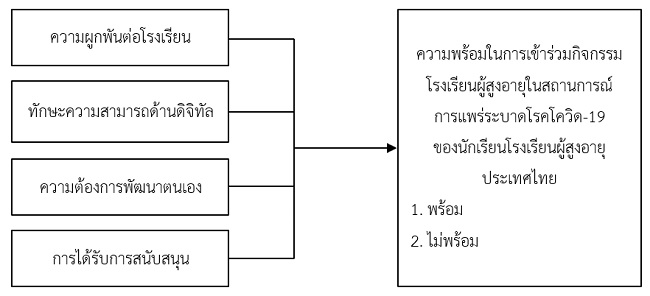THE READINESS TO PARTICIPATE IN ACTIVITIES OF THE ELDERLY SCHOOL DURING THE COVID-19 PANDEMIC PERIOD OF STUDENTS AT ELDERLY SCHOOLS IN THAILAND
DOI:
https://doi.org/10.14456/nrru-rdi.2022.44Keywords:
Elderly schools, Covid-19 pandemic, Discriminant analysisAbstract
The COVID-19 epidemic has been a huge impact on gatherings, meetings, and socializing of people, including school activities for the elderly, which cause many schools to delay their opening of operations or adjusting form of activities in more proper ways. The objectives of this research were to study the level of engagement of digital skills, self-improvement requisites, and obtaining support in participating in school activities of the elderly, and to analyze the factors that distinguish readiness to participate in school activities for the elderly in the situation of the COVID-19 pandemic at schools in Thailand. The sample was 795 students utilizing multistage sampling. Questionnaires were designed to collect data. The statistics utilized in the data analysis were frequency, percentage, mean, and S.D., utilizing discriminant analysis via stepwise method. The results revealed that the affiliation with elderly schools, digital skills, self-improvement, and support requisites was at a high level. When considering each aspect, it was found that the relationship with the schools for the elderly and the aspect of obtaining support was at the highest level. As for the need for self-development in the school, it was at a high level. While the digital skills were at a moderate level. There were two variables: digital capability and obtaining support that can be employed to classify readiness and unreadiness of groups of students in elderly schools to undertake activities at schools.
References
Boulton-Lewis, G. M., Buys, L., Lovie-Kitchin, J., Barnett, K., & David, L. N. (2007). Ageing, learning, and computer technology in Australia. Educational Gerontology, 33(3), 253-270.
Cheethangdee, K. (2019). The Guidelines for Development of Elderly Schools Performance in Lopburi Province. Pathumthani University Academic Journal, 11(2), 324-335. (In Thai)
Department of Older Persons. (2016). School Manual for the Elderly. Bangkok : Department of Older Persons. (In Thai)
Department of Older Persons. (2021). Registration of elderly schools 2021. Retrieved November 11, 2021, from https://www.dop.go.th/thai/service_information/1/14 (In Thai)
Department of Older Persons. (2021). The Action Plan for the Elderly, Phase 2 (2002-2022), Revision 2nd Ed, 2020. Retrieved June 11, 2021, from https://www.dop.go.th/th/th./laws/1/28 (In Thai)
Department of Older Persons. (2022). Statistics of the elderly. Retrieved January 15, 2022, from https://www.dop.go.th/th/know/side/1/1/857 (In Thai)
Devalersakul, N., Siriwarakoon, W., & Roadyim, C. (2016). The Development of the Elderly as a Burden to Power: Case Study of Rangsit City Municipality. Veridian E-Journal, Silpakorn University, 9(1), 529-545. (In Thai)
Formosa, M. (2019). Universities of the Third Age. Encyclopedia of Gerontology and Population Aging (pp. 1-6). Cham : Springer International Publishing.
Foundation of Thai Gerontology Research and Development Institute (TGRI). (2021). Situation of the Thai Elderly 2020. Nakhon Pathom: Institute for Population and Social Research, Mahidol University. (In Thai)
Kaewprom, C., In-Sricheun, S., Pongpumma, L. (2020). Self-esteem among Old Persons Participating in the Elderly School. Journal of Health Sciences Scholarship, 7(1), 76-89. (In Thai)
Khampuk, P., & Srirungruang, P. (2005). Stakeholders’ Opinion Toward Setting-up Hua-ngomSubdistrict Senior Citizen School, Phan District, Chiang Rai Province. National and International Conference Interdiscliplinary Resaearch for Local Development Sustainabillity 15th (pp. 139-150). Retrieved September 7, 2021, from http://gs.nsru.ac.th/files/2/12พวงนรินทร์%20%20คำปุก.pdf (In Thai)
Klichaya, P. (2020). The use of digital technology by the elderly and proposals for enhancing the empowerment of the Thai elderly. Retrieved September 7, 2021, from https://thaitgri.org/?p=39594 (In Thai)
Miankerd, W., & Ratanachuay, S. (2019). Promoting the development and monitoring of school operations for the elderly. Journal of MCU Peace Studies, 7(6), 1635-1651. (In Thai)
National Statistical Office. (2018). Demographic statistics Population and housing. Retrieved June 2, 2021, from http://statbbi.nso.go.th/staticreport/page/sector/th/01.aspx (In Thai)
Ordonez, T. N., Lima-Silva, T. B., & Cachioni, M. (2011). Subjective and psychological well-being of students of a University of the Third Age: Benefits of continuing education for psychological adjustment in the elderly. Dementia & neuropsychologia, 5(3), 216-225.
Rojanaprapha, W. (2017). Behavioral of Using Technology Affecting the Happiness Levels of the Elderly in Bangkok Metropolitan. Graduate school Suan Dusit University, 13(1), 89-104.
Saeloo, J., Kaewkrachok, T., & Samdaengsarn, D. (2021). How Social Support and Health Literacy Influence Quality of Life of Elders in Mueang District of Nakhon Si Thammarat. The Southern College Network Journal of Nursing and Public Health, 8(2), 39-52. (In Thai)
Songsri, C., Fuongtong, P., & Muenthaisong, S. (2018). Older Adults in Information Society. Udonthani Hospital Medical Journal, 26(3), 216-227. (In Thai)
Srisa-ard, B. (2017). Preliminary research (10th ed.). Bangkok :S uweerivasarn. (In Thai)
Srisupan, P., Tammiggabaworn, S., & Krisnajuta, S. (2017). The Elderly School and the Capacity Building of Isan Local Communities. Journal of Development Studies, 14(1), 133-162. (In Thai)
Tirakanan, S. (2007). Creating a tool to measure variables in social science research: a guide to practice. Bangkok : Chulalongkorn University Press. (In Thai)
Tirakoat, S., & Polnigongit, W. (2018). Internet usage behaviors, literacy, and attitude towards utilization of wellness content on the internet among Thai elderly. Journal of Nursing and Health Care, 36(1), 72-80. (In Thai)
Wangmahaporn, P. (2012). Cooperation in the management of schools for the elderly: Cross-case analysis. Bangkok : Center for Research Promotion and Development, Sripatum University. (In Thai)
Wanichbuncha, K., & Wanichbuncha, T. (2014). The use of SPSS for Windows in data analysis. (14th ed.). Bangkok : Samlada Printing House. (In Thai)
Yamane, T. Statistics : An Introductory Analysis (2nd ed.). New York : Harper & Row.

Downloads
Published
How to Cite
Issue
Section
License

This work is licensed under a Creative Commons Attribution-NonCommercial-NoDerivatives 4.0 International License.




